Connecticut Supreme Court Hears Oral Arguments at Trinity College
Hartford, Connecticut, October 19, 2018—Mather Hall’s Washington Room was transformed into a courtroom on Wednesday, October 17, when the Connecticut Supreme Court came to campus to hear oral arguments in two cases as part of the court’s “On Circuit” program, which educates students and residents of the state about the role and responsibilities of the appellate system. Trinity College students, faculty, staff, and members of the community had the opportunity to sit in on the proceedings of two real cases—one criminal and one civil—and ask questions of the participating litigators.
Since 1986, the Connecticut Supreme Court has traveled once a year to schools and universities throughout the state to encourage students and the public to observe oral arguments in appellate cases. The panels of justices on the bench for the day’s cases included two Trinity alumni: Associate Justice Richard N. Palmer ’72 and Senior Justice Christine S. Vertefeuille ’73. At a reception before the oral arguments began, some students were able to meet with the justices and hear about their journeys from Trinity to state’s highest court.
It was an initial connection between Palmer and Trinity student Brendan W. Clark ’21 that brought the court to campus. Clark, who is majoring in public policy and law and history, was interviewing Palmer last winter for an alumni profile article in the student newspaper, The Trinity Tripod, when he asked if the court would consider holding its “On Circuit” program at Trinity. Palmer was interested, and an official letter of inquiry from Clark got the process started. Clark said, “To me, as someone who wants to go to law school, to bring the court here is incredibly rewarding and enriching. Students were able to talk face-to-face, one-on-one with the justices—that doesn’t happen every day of the week.”
Palmer, who was a political science major and captain of the squash and tennis teams at Trinity, said he was thrilled to bring the Connecticut Supreme Court to his alma mater. “I hope the students enjoy it and really get something out of it,” he said. “Coming to them makes it easier to see what’s going on. This is not a moot court; these are real cases.”
Vertefeuille added, “Our court is always open to the public, but this program makes it easier for students to access. The court has a real educational mission to show people how the court works.” The justice recalled fond memories of her time at Trinity, where she studied political science and enjoyed serving in legislative internships. Vertefeuille said that she was proud to be the first woman on the college’s Board of Fellows. “I’m happy to be back here today,” she said.
Trinity College President Joanne Berger-Sweeney welcomed the justices and thanked them for emphasizing the importance of civil discourse. “An important commitment of the liberal arts is to educate citizens,” Berger-Sweeney said. “The alumni justices are a real model for our current students of people who have earned their degrees and who have become engaged citizens and given back to their community.”
After the court session was officially opened, the justices began to hear oral arguments from lawyers representing each side of a case. In the first case, State of Connecticut v. Jean Jacques, the defendant was appealing his murder conviction, claiming that evidence found in his apartment should have been excluded from his trial because it was obtained without a search warrant. The trial court ruled against the defendant, agreeing with the prosecutor’s argument that no warrant was needed because the defendant had done nothing to maintain a reasonable expectation of privacy in the apartment and to secure his possessions there. The defense argued that the state did not prove the defendant’s voluntary abandonment of the apartment and that the landlord would have had to start an eviction proceeding in court to recover the apartment from him.
In the second case, Austin Haughwout v. Laura Tordenti et. al., a former college student sued various administrators at Central Connecticut State University after he was expelled for making statements and gestures related to guns and mass gun violence. Haughwout claimed that the school violated his right to freedom of speech under the First Amendment to the United States Constitution. Haughwout was appealing the trial court decision, which upheld his expulsion. His attorneys seek his reinstatement as a student and the expungement of his record.
Professor of the Practice in Public Policy and Law Glenn W. Falk and Visiting Assistant Professor of Public Policy and Law Matthew A. Weiner hosted Question and Answer sessions in which litigators in each case addressed questions from Trinity students, including public policy and law major Kira Eidson ’19. For Eidson, part of the value of the “On Circuit” program is the greater level of insight and understanding that the experience brings. “I believe it is important to educate people on the trial and appeals process, and this program makes the court more accessible to college students,” she said. Eidson said that she was particularly interested in the second case because of its First Amendment argument. “I’m a first-year mentor for a class on free speech, and lots of the students were here. Hearing this will help facilitate a better class discussion,” she said.
Trinity’s Public Policy & Law Program sponsored the event and served as the liaison to the court. Associate Professor of Legal and Policy Studies Adrienne Fulco said that the program’s success was made possible by the coordination of Trinity’s Calendar and Special Events Office, Information Technology Services, Campus Safety, Office of Communications, and many others. “We held two meetings with the court staff on campus, and our whole team of Trinity faculty, staff, and students worked seamlessly with them,” Fulco said. “This is civic engagement at its best!”
When the Supreme Court’s decisions in these cases are released, they may be accessed through the Advance Release Opinions page on the state’s Judicial Branch website.
Connecticut Supreme Court at Trinity College
Connecticut Supreme Court at Trinity College
Chief Justice Richard A. Robinson (right) speaks to Trinity students. Photo by Helder Mira.
Left to right: Associate Professor of Legal and Policy Studies Adrienne Fulco, Trinity College President Joanne Berger-Sweeney, and Senior Justice Christine S. Vertefeuille ’72 gather at a reception before the court session began. Photo by Helder Mira.
Mather Hall’s Washington Room was transformed into a courtroom on Wednesday, October 17, when the Connecticut Supreme Court came to campus to hear oral arguments in two cases as part of the court’s “On Circuit” program, which educates students and residents of the state about the role and responsibilities of the appellate system. Photo by Nick Caito.
Associate Justice Richard N. Palmer ’72. Photo by Nick Caito.
Lawyer S. Max Simmons answers questions from the audience at Trinity College after arguing a case before the Connecticut Supreme Court. Photo by Nick Caito.
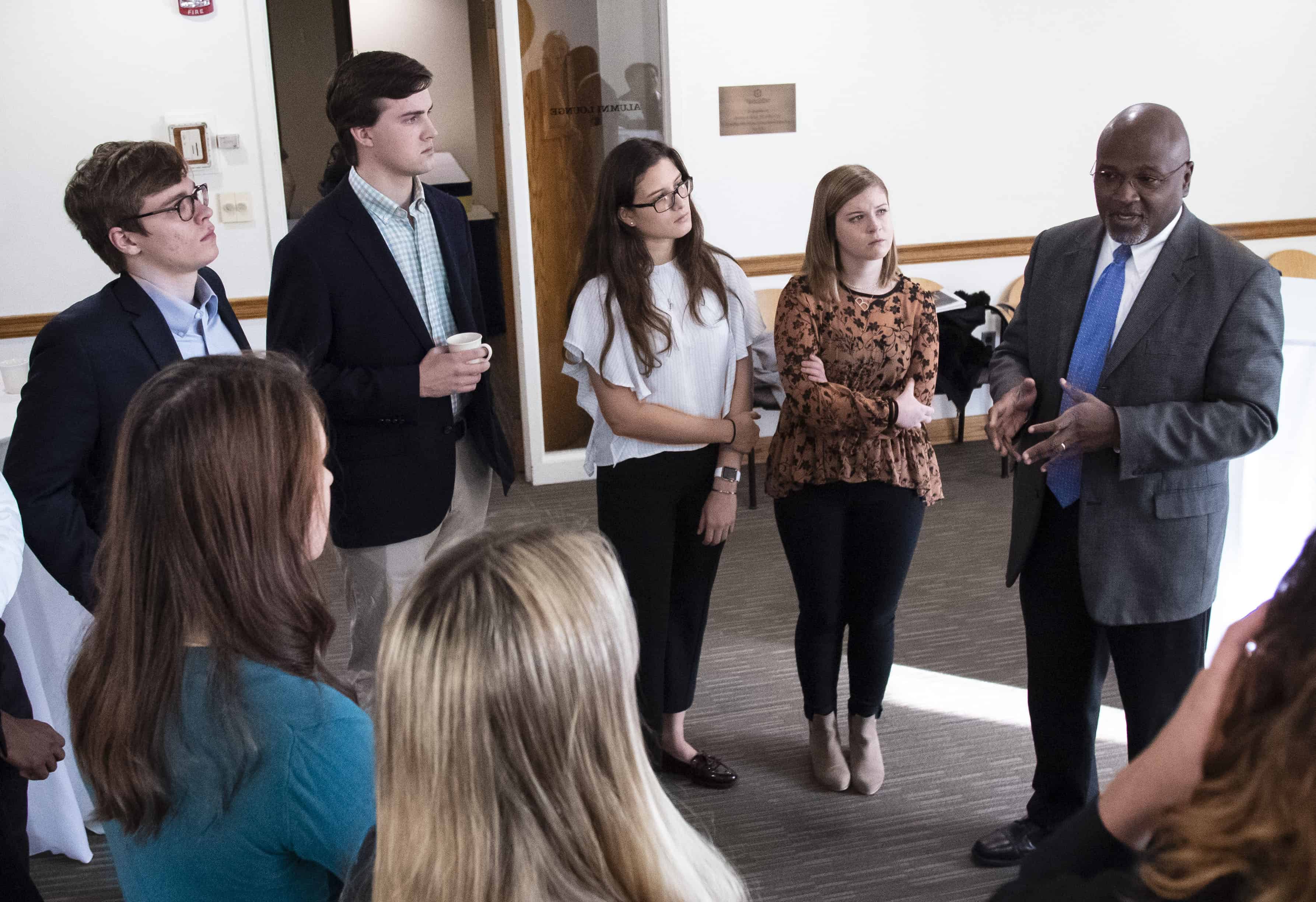
Chief Justice Richard A. Robinson (right) speaks to Trinity students. Photo by Helder Mira.
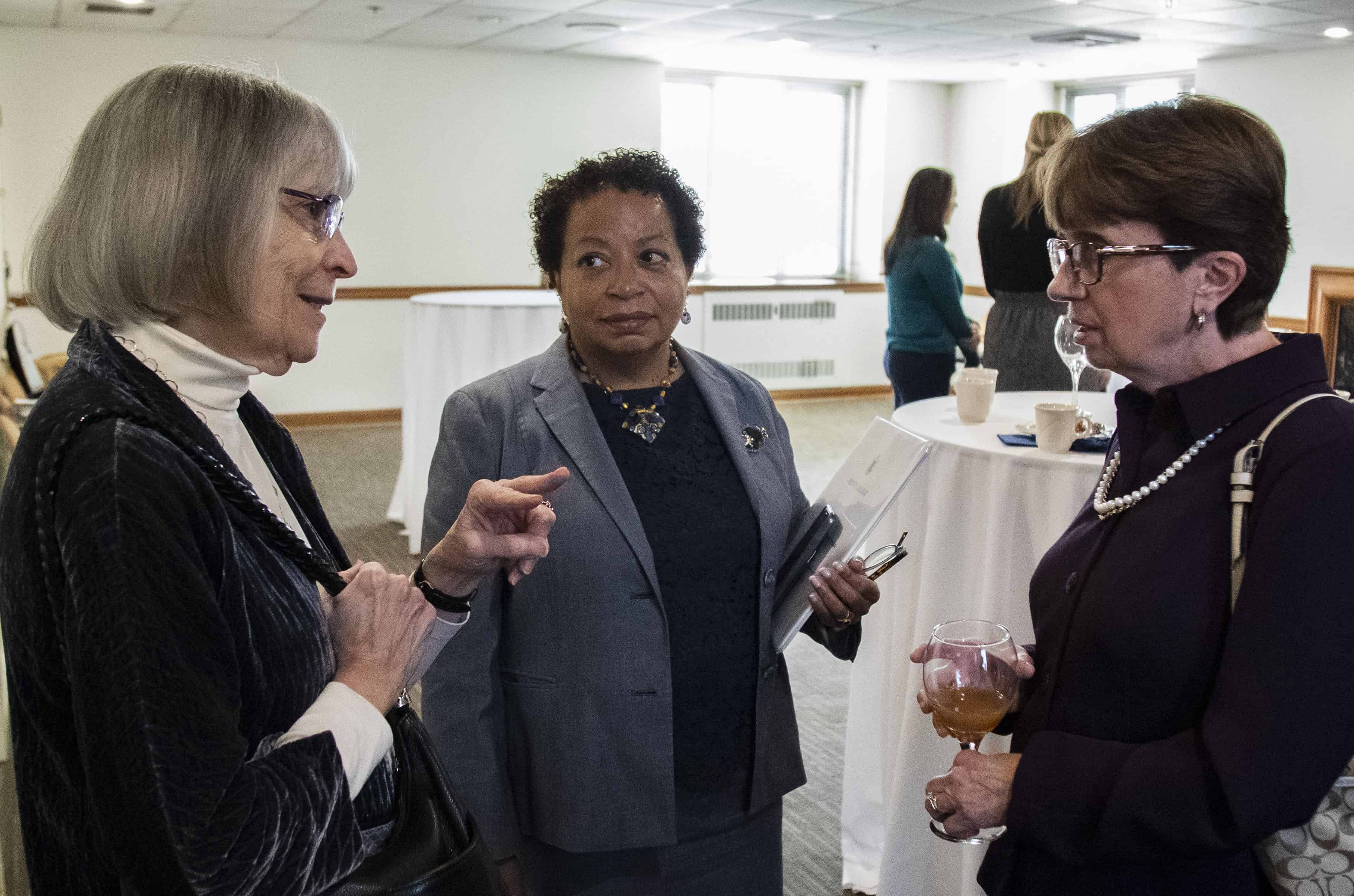
Left to right: Associate Professor of Legal and Policy Studies Adrienne Fulco, Trinity College President Joanne Berger-Sweeney, and Senior Justice Christine S. Vertefeuille ’72 gather at a reception before the court session began. Photo by Helder Mira.
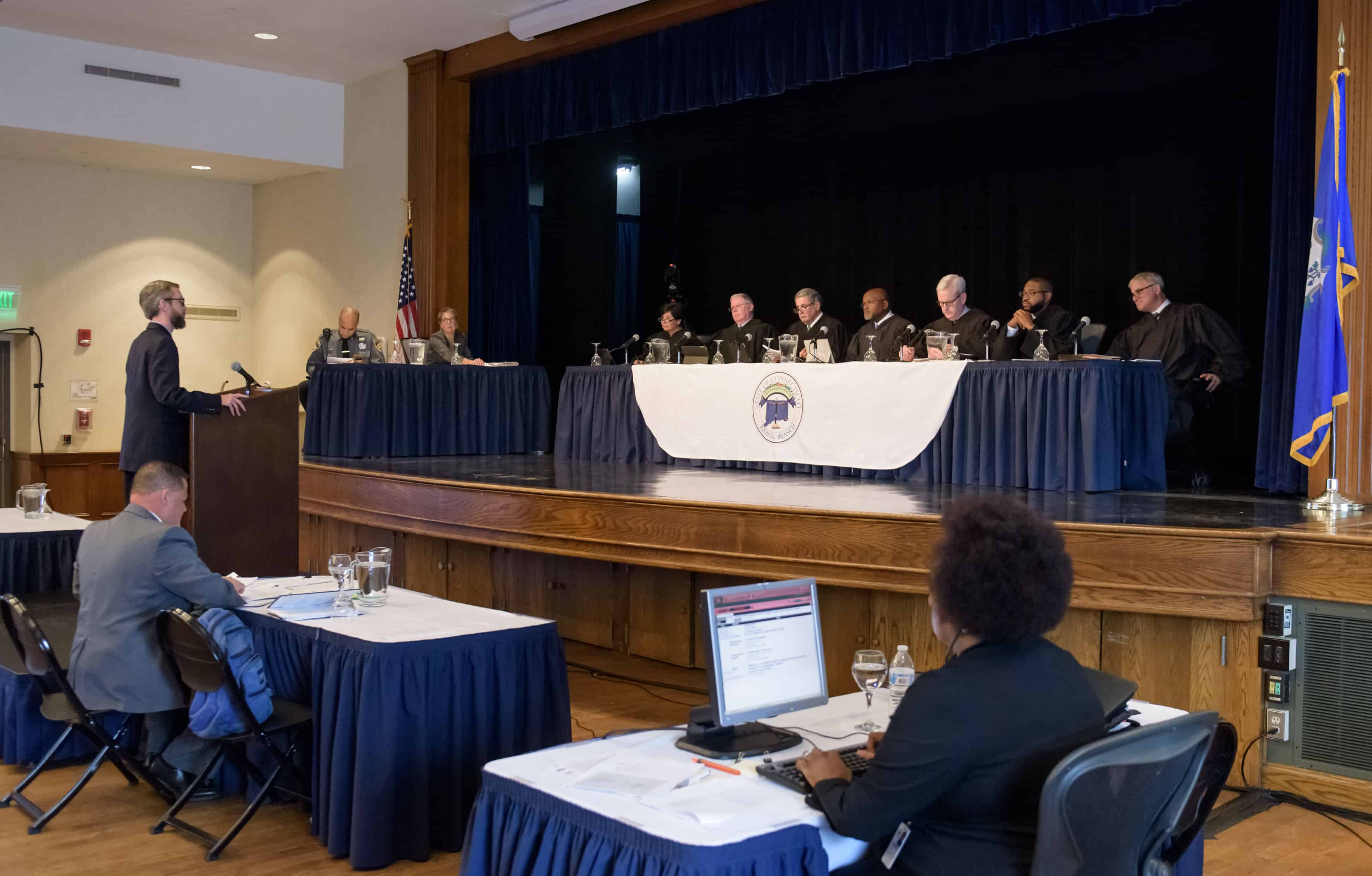
Mather Hall’s Washington Room was transformed into a courtroom on Wednesday, October 17, when the Connecticut Supreme Court came to campus to hear oral arguments in two cases as part of the court’s “On Circuit” program, which educates students and residents of the state about the role and responsibilities of the appellate system. Photo by Nick Caito.
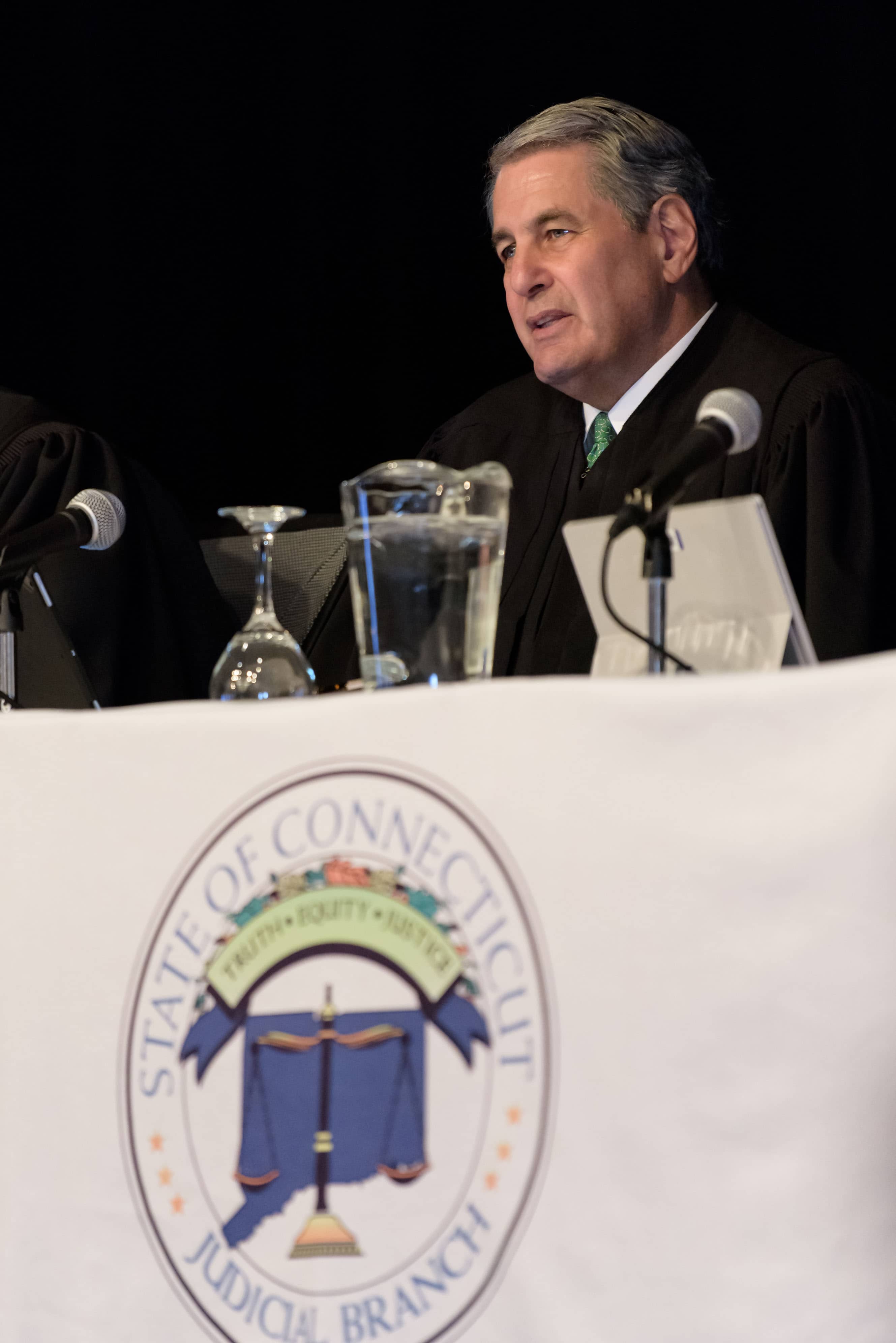
Associate Justice Richard N. Palmer ’72. Photo by Nick Caito.
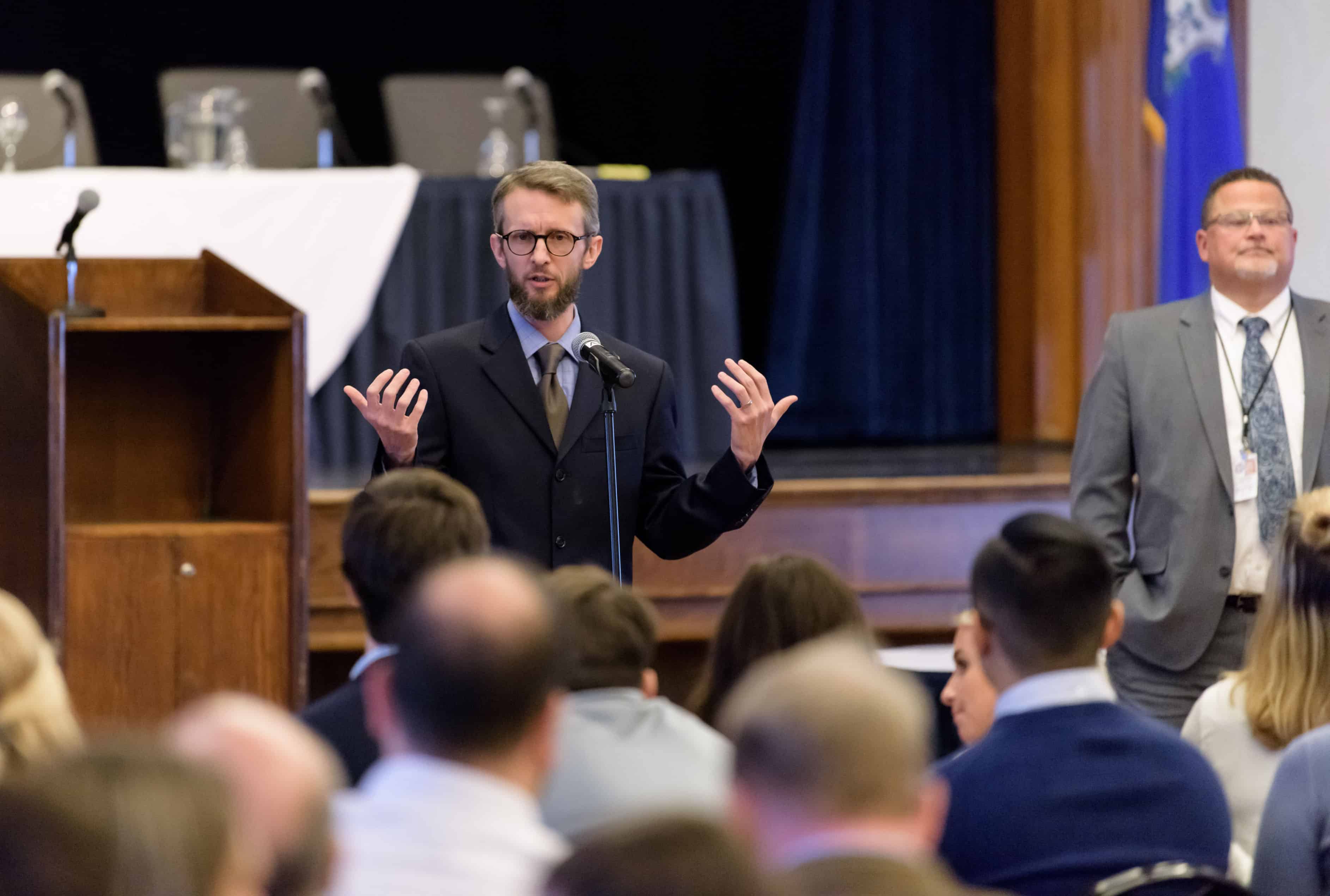
Lawyer S. Max Simmons answers questions from the audience at Trinity College after arguing a case before the Connecticut Supreme Court. Photo by Nick Caito.
